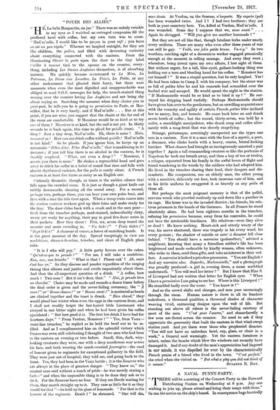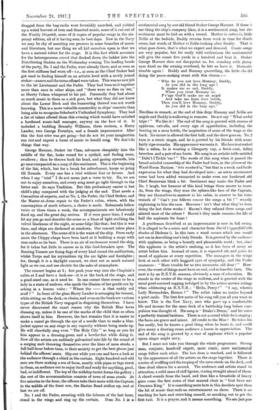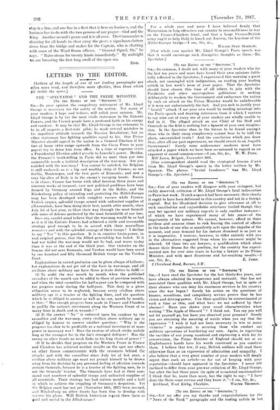A NAVAL FUNNY-PARTY.
dragged from the bag-racks were feverishly searched, and yielded .up a weird harvest of torn and thumbed music, some of it out out of the Weekly Diepalch, some of it copies of popular songs in the six- penny edition, all of it having seen its best days. Now in the Navy we may be shy of asserting our prowess in some branches of music and literature, but one thing we all kid ourselves upon is that we have a natural talent for the stage. It is this fact which accounts for the heterogeneous crowd that flocked down the ladder into the Distributing Station on the Wednesday evening. The leading hands of the party, No. 1 and the Padre, were already there, and as soon as the first stiffness had worn off—i.e., as soon as the Chief Stoker had got used to finding himself on an artistic level with a newly joined stoker—names and the turns offend were taken. This was no new job to the 1st Lieutenant and the Padre. They had been on it together more than once in other ships, and "there were no flies on 'em," as Shorty Colson whispered to his pal. Personally they had about as much music in them as a sick goat, but what they did not know about the Lower Deck and the humouring thereof was not worth knowing. This is a more valuable commodity in ships' concerts than being able to recognize Schubert's Unfinished Symphony. They had a list of talent offered them this evening which would have satisfied a hardened music-hell manager, anyway on the face of it. It included a budding Brausby Williams, three recitera, a Harry Lauder, two George Formbys, and a female impersonator. After this the first trier was got going—but do not let your imagination run riot and expect a burst of music to herald song. We don't do things that way.
George Harmer, Stoker let Class, advances sheepishly into the middle of the flat, looks round for a spitkid, and finding none, swallows ; then he throws back his head, and gazing upwards, lets go unaccompanied on a song of dire sentiment. This is the beginning of the list, which, but for a break for refreshment, keeps us going till Roundel. Every one has a trial without fear or favour. And when I say " trial " I do not mean just a verse to try. No, we are out to enjoy ourselves, and every song must go right through to the hitter end. So says Tradition. But this preliminary canter is but ehild'splay compared with the judging at the end. That needs a Committee of experts, and so No. 1, the Padre, the Chief Stoker, and the Master-at-Arms repair to the Padre's cabin, where, with the consumption of much tobacco, a choice is made. Rehearsals follow twice or three times a week, the accompaniments are laboriously fixed up, and the great day arrives. If it were peace time, I would let my pen go and describe the scene as a blaze of light stabbing the velvet blackness of the night, or some bilge like that; but this is war time, and ships are darkened at sundown. Our concert takes place in the afternoon. The scene of it is the waist of the ship. From early morn the Chippy-chaps have been hard at it building a stage with rum-casks as its base. There is an air of excitement round the ship, for it takes but little to amuse us in this God-forsaken spot. The Bunting Tossers are fixing flags of every kind round the auditorium, whilst Torps and his myrmidons rig the are lights and footlights ; for, though it is a daylight concert, we shut out as much natural light as we can and use electric for the sake of atmosphere.
The concert begins: at 3 ; but push your way into the Chaplain's cabin at 2 and have a look-see--it is at the back of the stage, and a good-sized one, as it need be. In one corner there seems to be a lady in a state of undress, who spoils the illusion of her gentle sex by asking in a hoarse voice : " Where the — is that ruddy red stuff ? " In front of the glass Harry Lauder is arranging his bonnet, while sitting on the deck, on chairs, and even on the bunk are various types of the British Navy engaged in disguising themselves. I have never discovered the exact reason why the British Blue loves dressing up, unless it be one of the marks of the child that so often shows itself in him. However, the fact remains that it is easier to make a camel go through the eye of a needle than to make a blue- jacket appear on any stage in any capacity without being made up. He will cheerfully sing even "The Holy City" as long as you let him appear in a dressing-gown and a bowler-hat while doing it. Now all the artiste are suddenly galvanized into life by the sound of a surging mob throwing themselves over the lines of mess stools, a full half-hour before time, in their anxiety to get the best places just behind the officers' seats. Slip out while you can and have a look at the audience through a chink in the curtain. Eight hundred and odd men are there making a sea of faces, mostly with pipes or fags stuck in them, an audience out to enjoy itself and ready for anything, good, bad, or indifferent. The top of the midship turret forme the gallery ; the test of the accommodation consists of rows of mess stools. At five minutes to the hour, the officers take their seats with the Captain in the middle of the front row, the Marine Band strikes up, and at last we are off.
No. 1 and the Padre, sweating with the labours of the last hour, stand in the sings and ring up the curtain. Item No. 1 is a
sentimental song by our old friend Stoker George Harmer. If there is one thing the ship's company likes, it is a sentimental song, but the sentiment must be laid on with a troweL Mother is extreinia, little Nellie at the bedside, Daddy returns from work in time for death scene, last words of Mother re Nellie looking after Daddy. That is what goes down, that is what we expect and demand. Comic song. are very popular, but for really wild enthusiasm the sentimental will give the comic. five yards in a hundred and beat it. Stoker George Harmer does not disappoint us, for, standing with glassy eyes fixed on the awning overhead, he lets us have it. Domestic trouble again ! Daddy and Mummy quarrelling, the little che-ild doing the peace-making stunt with this chorus :-
" Why do you not love• Mummy, Daddy,
As you did in the long ago ?
It makes me as sad, Daddy,
When you treat Mummy so.
P'eaps God'll make me an angel And take me from here below, Then you'll love Mummy, Daddy,
As you did in the long ago."
Needless to remark, at the end of this dirge Mummy and Nellie are angels and Daddy is wallowing in remorse. Do not say " What awful tripe ! " We like it The end of the song is greeted with storms of applause, catcalls, and every sign of approbation, including the beating on a mass kettle, the inspiration of some of the wags at the back. No encore is allowed the first half, and the show goes on. No. 2 turn is a comic singer, and he is greeted by his friends with some fairly ripe remarks. His appearance warrants it. His face is streaked like a zebra, he is wearing a Glengarry cap, a frock-coat, riding breeches, and a pair of sea boots. His song is an artistic trifle entitled "Didn't I Tickle 'em ? " The words of this song when it passed the broad-minded censorship of the Padre had been, in the phrase of the Ward-Room Marines, "fits moutardie," but that is a weak and futile expression for what they had developed into ; an extra uncensored verse had been added warranted to make even our hardened old Chief Boatswain blink a bit. Sentiment may make the Padre and No. 1 laugh, but humour of this kind brings them nearer to tears. As, from the wings, they scan the sphinx-like face of the Captain, they see themselves to-morrow in his cabin, in answer to his terse remark of " Can't you fellows censor the songs a bit " wearily explaining to him the ease. Heavens ! isn't that what they've been doing the last three weeks ? Haven't they refused three songs and altered most of the others ? Haven't they made enemies for life of half the aspirants for fame ?
A gentleman described as an impersonator is now in full swing. It is alleged to be a scene and character from David Copperfield (Oh shades of Dickens 1). In this turn a word occurs which one would not use in describing one's lady friends. It is greeted by the audience with applause, as being a homely and pleasurable word ; but, alas! this applause is the artist's undoing, as it has been of many an artist before him. Instead of once, it is repeated oft, and gains its mead of applause at every repetition. The managers in the wings look at each other with haggard eyes of sympathy, and the Padre murmurs "More trouble for us two innocents, old dear ! " How- ever, the worst of things most have an end, and so has this turn. The next is by an R.N.V.R. seaman, obviously a man of education. He stands in the centre of the stage in uniform, and is greeted with the usual good-natured ragging indulged in by the active service ratings when addressing an R.N.V.R.: "Hello, Percy !" "I say, where's Lady Marmaduke, Horace ? " The artist takes no notice beyond a quiet smile. The first few notes of his song tell you all you want to know. This is the New Navy, men who gave up a comfortable life and income for the mesa deck of a battleship long before com- pulsion was thought of. His eong is " Drake's Drum," and his voice a perfectly trained baritone. There is not a sound while he is singing ; the faces are grave and intent. All credit to the Blue ! He takes his fun easily, but he knows a good thing when he hears it, and could give many a drawing-room audience a lesson in appreciation. The end of the song is greeted by a roar of applause which a popular opera singer might envy.
But I must not take you through the whole programme. Strong man, conjurer, handcuff expert, more comic, more sentimental songs follow each other. The last item is reached, and is followed by the appearance of all the artiste on the stage together. There is a noise of scuffling and the rasping of the mess stools on the deck, and then dead silence for a second. The audience and artists stand to attention, a solid mass of stiff figures, staring straight ahead of them. A shoed sounds from the band, and then like a broadside of heavy guns come the first notes of that massed choir in " God Save our Gracious King." It is something more here in this desolate spot than the bit of music that ends an entertainment on shore. There is no reaching for hate and stretching oneself, or sneaking out to get the first taxi. It is a prayer, and it means something. We are justpne ship in a line, and one line in a flout that is hero on business, and the business has to do with the two persons of our prayer—God and the King. Another second's pause and it is all over. The Commander is shouting for all hands to clear away the gear; a signalman clatters down from the bridge and makes for the Captain, who is chatting with some of the Ward.Room officers. "General Signal, Sir," ho says. " Raise steam for twenty knots immediately." By midnight we arc breasting the first long swell of tho open sea.
Bleu.








































 Previous page
Previous page